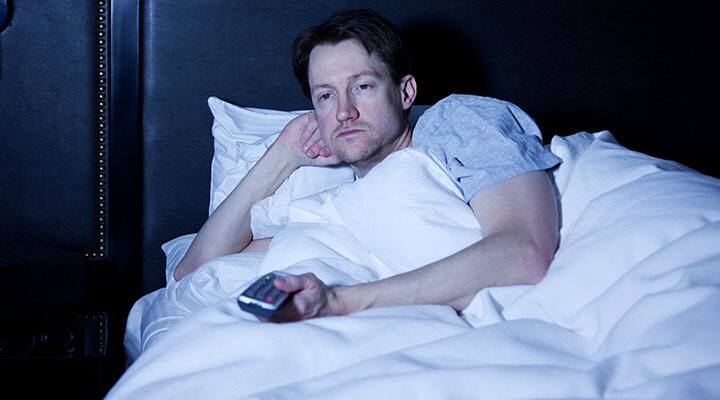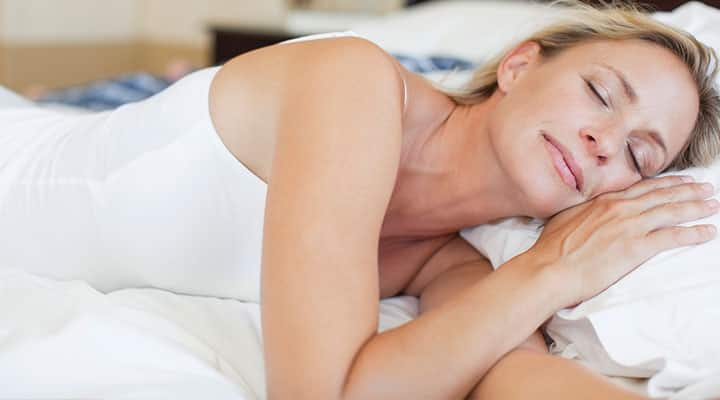
Can A Lack of Sleep Make You Feel Older?
Can A Lack of Sleep Make You Feel Older?
We've heard it all our lives; good health starts with a good night's sleep. But for those who have issues sleeping, whether sleep deprivation, insomnia, or something else, there is another underlying issue that can be unexpected when it comes to sleep and aging: your unhealthy sleep habits could actually make you "feel" older.
Yes, you read that correctly. A study from the University of Exeter in the UK suggests that you are more likely to perceive yourself to be older than your biological age if you don't get enough sleep.
Researchers looked at the aging and sleep patterns of nearly 4,500 adults aged 50 years and higher, asking them about sleep quality and sleep duration and giving them cognitive performance tests and lifestyle questionnaires. The participants were given the same questionnaire twice—once at baseline and again a year later. The result? Overall, those who reported sleeping poorly also had a higher awareness of negative age-related changes, while those who slept better tended to feel younger.
"Our research suggests that poor sleepers feel older and have a more negative perception of aging," noted Serena Sabatini, the lead author of the study.
Poor sleep and age perception
One interesting finding of the study: middle-aged adults with healthy sleep habits tended to feel younger than their biological age, but those who had trouble sleeping felt every year of their actual age…or, more troubling, they felt older than they were.
Why does this matter? If you feel like you are older than your actual age, it can have a lasting impact on your physical, mental and cognitive health.
"As we know that having a negative perception of aging can be detrimental to future physical health, mental health, and cognitive health, an open question in aging research is to understand what makes people more negative about aging," Sabatini wrote.
On the flip side, she added, "it could be a sign that addressing sleep difficulties could promote a better perception of aging, which could have other health benefits."
How much sleep do you need?
Everyone is a little different, but there are some thoughtful guidelines to follow. The CDC's recommended sleep by age states that adults (18 - 60 years old) should get seven or more hours each night. Of course, quality sleep matters as much as quantity!
So, what is a "good night's sleep"? There are four stages of sleep, and your body needs to experience each of them to rest, recover and prepare for the next day.
- The first 5-10 minutes when you are in bed, comfy, with your eyes closed and beginning to fall asleep; that's stage one.
- Stage two is slightly longer than the first stage, and it's a little different from the rest. Stage two is the gateway to other stages of sleep, and you'll experience it more than once each night with your temp dropping and your eyes staying still.
- The deepest stage is stage three. This is the phase that helps you feel refreshed in the morning.
- But stage four is most people's favorite - REM sleep. REM stands for rapid eye movement, and many believe that's because this is when you dream.
What are the effects of too little sleep?
A review of the scientific literature indicates that, "...maintaining good sleep quality, at least in young adulthood and middle age, promotes better cognitive functioning and serves to protect against age-related cognitive declines."
As we get older, insufficient sleep has been linked with a slew of new health concerns. We're not just talking about dark circles under your eyes. Memory loss, dementia and mood swings are just some examples of what can happen to our brain health.
In addition, your cortisol levels could be thrown off balance and impact your healthy stress response. And, you might have problems performing day-to-day tasks, making decisions, and recovering from workouts…suffice it to say, sleep loss is no fun!
What causes sleep deprivation?
Simply put, not getting that recommended 7 hours of sleep on a regular basis means you are sleep-deprived. Understanding the cause isn't so simple.
For some, it's simply not following a schedule, and the circadian rhythms that govern our sleep are thrown off. Others are kept awake by the screens and the blue light they emit.
Stress, poor diet and a lack of exercise also play a part. There are also more serious reasons you aren't getting the sleep you need. If you feel that it is serious, schedule an appointment with your doctor to see what may be causing your issues.
How to fall asleep naturally?
So by now, you are probably saying, "I don't want to feel older! How can I get better sleep?" Lucky, there are some simple techniques you can do to improve your sleep and sleep habits.
The best way to avoid sleep problems and the resulting fatigue is to have a consistent bedtime. Choose a quiet place to sleep. Get some exercise every day and soak in some sun if possible. Avoid stimulating activities such as watching television or using your smartphone in the hours before bedtime.
All of that sounds easy, but you may need a little help. If you are looking to avoid sleeping pills and prefer a natural solution, you're in luck. Melatonin and valerian root have been the go-to ingredients for some time, and for a good reason, they work.
A glass of warm milk sounds like an old wives' tale, but there is actually some science behind it. Research shows that bioactive milk peptides can help reduce stress and lead you to a restorative night's sleep.
Another aspect of sleep has also come to light – your gut. Research also shows stress can alter your gut microbiome. This can lead to interference with your sleep patterns. The answer: bringing balance back to your microbiome with probiotics.
References
- Bah, Theirno M et al. "Sleep as a Therapeutic Target in the Aging Brain." Neurotherapeutics, July 2019, https://pubmed.ncbi.nlm.nih.gov/31376067/
- Jaatinen, Nora et al. "Effects of daily intake of yoghurt enriched with bioactive components on chronic stress responses: a double-blinded randomized controlled trial." Int J Food Sci Nutr., June 2014, https://pubmed.ncbi.nlm.nih.gov/24490888/
- Sabatini, Serena et al. "Cross-Sectional and Longitudinal Associations between Subjective Sleep Difficulties and Self-Perceptions of Aging." Behavioral Sleep Medicine, October 2021, https://www.tandfonline.com/doi/full/10.1080/15402002.2021.1994405
- Scullin, Michael K et al. "Sleep, cognition, and normal aging: integrating a half century of multidisciplinary research." Perspect Psychol Sci., January 2015, https://pubmed.ncbi.nlm.nih.gov/25620997/
- Troynikov, Olga et al. "Sleep environments and sleep physiology." J Therm Biol., December 2018, https://pubmed.ncbi.nlm.nih.gov/30509635/
- "How Much Sleep Do I Need?" Centers for Disease Control and Prevention, https://www.cdc.gov/sleep/about_sleep/how_much_sleep.html
About Our Story Sources
The Life Extension Health News team delivers accurate information about vitamins, nutrition and aging. Our stories rely on multiple, authoritative sources and experts. We keep our content accurate and trustworthy, by submitting it to a medical reviewer.


